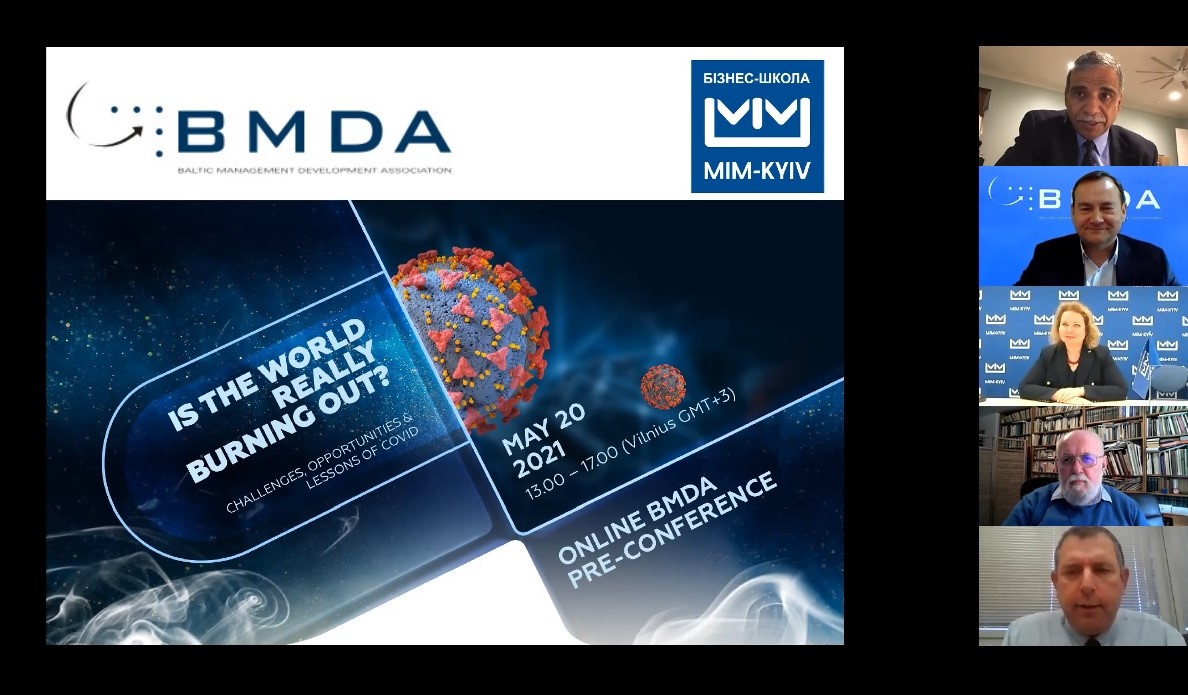“Difficulties come in our way to make us better, not bitter. Either you can feel stressed or have the sense of being blessed… Anytime I see something is happening I see that as a calling. And in response to the calling, we need to be prepared and we need to make sure that people who work for us or work with us, are safe, peaceful and healthy,” Prof Dipak C. Jain, the European President and Professor of Marketing at CEIBS, China/USA said.
Iryna Tykhomyrova, MIM-Kyiv President shared how lockdown challenged ourselves on the one hand and triggered the growth based on the latest implemented technologies.
“I am privileged to host the BMBA pre-conference for the second year in a row. Last year we did not think that our staying under the lock and key would last long. We were sure that it would end soon. However, the year passed but the situation did not change much. Moreover, our format of the conference does not surprise us anymore. We got used to ZOOMing. We found numerous advantages. We can connect, break barriers and borders and continue our work and socializing,” she underlined.
Virginijus Kundrotas, the President of the BMDA, Lithuania, and the Dean of Adizes Graduate School, USA mentioned that long-term stress and restrictions increase the burnouts’ risks. As we do not know how long we are going to live under such conditions, we need to learn how to live and work in the new environment.
“We are living through the huge change… We cannot do something as we used to do. So, first of all, we need to make a decision about what new we have to choose. What are the things that we need to do? And it is not always as clear. And then we need to implement the decision. And that the implementation is always connected with the risk that we would not be able to implement it as planned or we would not be able to implement that at all. And because of the uncertainty and because of the risk people are in huge frustration. And if the change is huge, then the frustration is becoming even bigger. And if we have that stress, pressure, frustration for long, it is very easy to get burnout,” Virginijus Kundrotas said.
The systemic challenges we are facing call for systemic solutions. No wonder that mental health and medicine experts joined business practitioners and academicians to discuss the potential remedies.
“30% of working healthcare professionals are burnt out in normal circumstances... In the profession, we have plenty of risk factors. People feel the anxiety of an unknown, incomprehensible nature. … We need communication exchange in search of a solution. We need equality. Nobody should have a privilege to know better… I am in the same boat as you trying to sail the windy sea... In looking for new solutions we are all equal,” Eugenijus Laurinaitis, General Secretary of European Association for Psychotherapy, mentioned when discussing our new reality.
Earlier all processes were designed to promote productivity. Now, when the situation is changed and hybrid working blurred the lines between working and personal lives the leaders need to help their teams strike the right balance. Taking care of the personal needs of employees becomes an important part of leaders’ activities.
Andrzej Borczyk, the HR Director of Grupa Żywiec at Heineken Group in Poland shared his company's experience: “We ensure that wring from home is very similar to working from the office. So, we are renting the monitors to our employees. We also rented the tablets for the kids of our employees. We are very proud that we set new types of rules: there are no emails over the weekends; there is a break from 12 to 1 every day, and we ensure that on Friday afternoon no meetings are planned. It is the time that everyone can dedicate to the summary of the week, self-development, and preparing for the next week. We have a special program for the leaders. We ensure that they are spending their efficient time delivering the results,that they are close to people. And especially, we deliver the mental training for them.”

Photo: the screen shot of the event